
EQA-International Journal of Environmental Quality
Scope & Guideline
Advancing knowledge for a sustainable future.
Introduction
Aims and Scopes
- Environmental Pollution and Remediation:
Research focusing on the assessment, monitoring, and remediation of environmental pollutants, particularly heavy metals, pesticides, and other toxic substances in various ecosystems. - Sustainable Land and Water Management:
Studies addressing sustainable practices in land use, water quality, and soil management, including the use of innovative technologies and methodologies for resource conservation. - Ecological and Biodiversity Assessments:
Investigations into the ecological dynamics of ecosystems, including species diversity, habitat integrity, and the impacts of anthropogenic activities on biodiversity. - Climate Change and Environmental Impact:
Research examining the effects of climate change on environmental quality, including its impact on agriculture, water resources, and ecosystem services. - Innovative Environmental Technologies:
Development and application of novel technologies for environmental monitoring and remediation, including bioremediation, nanotechnology, and GIS methodologies.
Trending and Emerging
- Heavy Metal Pollution and Bioremediation:
There is an increasing focus on the study of heavy metal contamination and the use of bioremediation techniques, reflecting a growing concern over industrial pollution and its ecological impacts. - Impact of Climate Change on Ecosystems:
Research addressing the implications of climate change on various ecosystems is trending, with a focus on adaptive strategies and resilience in agriculture, water resources, and biodiversity. - Integration of Technology in Environmental Assessment:
The application of advanced technologies such as GIS, remote sensing, and machine learning for environmental monitoring and assessment is becoming more prevalent, indicating a shift towards data-driven research. - Circular Economy and Waste Management:
Emerging studies are increasingly focused on the principles of circular economy, particularly in waste management and resource recovery, as solutions to mitigate environmental degradation. - Public Health and Environmental Quality:
There is a growing intersection between environmental quality and public health research, particularly regarding the impacts of environmental pollutants on human health and wellbeing.
Declining or Waning
- Traditional Agricultural Practices:
Research focusing on conventional agricultural practices has decreased, likely due to a growing emphasis on sustainable and innovative approaches to agriculture that enhance environmental quality. - General Environmental Awareness Studies:
Studies that broadly address environmental awareness without a focused research question or methodology have seen a decline, as the journal shifts towards more empirical and data-driven investigations. - Basic Water Quality Studies:
While water quality remains a critical area, there has been a noticeable decline in basic assessments without innovative methods or technologies, as researchers are now favoring more complex analyses involving advanced modeling and assessment techniques.
Similar Journals
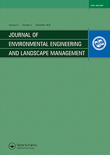
Journal of Environmental Engineering and Landscape Management
Exploring the Intersection of Nature and EngineeringJournal of Environmental Engineering and Landscape Management, published by VILNIUS GEDIMINAS TECH UNIV, serves as a pivotal platform for disseminating innovative research in the fields of environmental engineering and landscape management. With an Open Access policy since 2018, this journal fosters global knowledge exchange and accessibility, enhancing collaboration among researchers, professionals, and students alike. The journal, indexed under ISSN 1648-6897 and E-ISSN 1822-4199, features a diverse range of topics covering environmental engineering, management policies, and conservation strategies, thus contributing to sustainable development practices. As of 2023, it holds a Q3 quartile ranking across multiple categories, including Environmental Engineering and Nature and Landscape Conservation, demonstrating its commitment to excellence amidst competitive academic fields. The journal spans from 2004 to 2024, steadily solidifying its influence and relevance in shaping environmental discourse and practices. Join a vibrant community of scholars dedicated to addressing pressing environmental challenges through this distinguished publication.
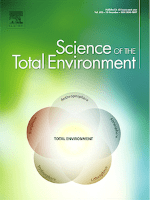
Science of The Total Environment
Leading the Way in Environmental Research ExcellenceScience of The Total Environment, an esteemed journal published by Elsevier, holds a significant position in the field of environmental science, encompassing critical areas such as Environmental Chemistry, Environmental Engineering, Pollution, and Waste Management and Disposal. With an impressive impact factor and ranked in the Q1 quartile across its categories for 2023, the journal is recognized for its high-quality research output and contribution to environmental sustainability. Operating from its base in the Netherlands, the journal has been a valuable resource since its inception in 1972, welcoming innovative studies that address complex environmental challenges. Its notable rankings—such as Rank #9 in both Environmental Sciences and Pollution—underscore its relevance and influence in the academic community. Although the journal currently does not provide an open access option, the robust findings and discussions presented within its pages continue to foster a deeper understanding of environmental issues. Science of The Total Environment is an essential platform for researchers, professionals, and students dedicated to advancing knowledge and solutions in the rapidly evolving field of environmental science.

Carpathian Journal of Earth and Environmental Sciences
Bridging Disciplines for Environmental SolutionsCarpathian Journal of Earth and Environmental Sciences is a distinguished academic journal dedicated to advancing the interdisciplinary field of Earth and environmental sciences. Published by the Carpathian Association for Environment and Earth Sciences, this journal plays a pivotal role in disseminating high-quality research focused on the dynamic interactions between geological processes and environmental changes. With an ISSN of 1842-4090 and an E-ISSN of 1844-489X, the journal is indexed in Scopus and holds an esteemed Q3 quartile ranking in both Earth and Planetary Sciences and Environmental Science categories as of 2023. Since its inception in 2008, the Carpathian Journal has provided an open access platform for researchers, professionals, and students to share insights, foster collaboration, and engage in critical discussions on pressing environmental issues. By continuously contributing to the body of knowledge in this field, the journal not only enhances academic discourse but also promotes sustainable environmental practices across Romania and beyond.

Environmental Sciences Europe
Unlocking access to vital environmental insights.Environmental Sciences Europe is a leading peer-reviewed journal published by SPRINGER, dedicated to advancing research in the field of environmental science, with a specific focus on pollution and its mitigation. Since its transition to Open Access in 2011, the journal has been committed to disseminating high-quality research without barriers, thereby ensuring that critical knowledge is freely accessible to researchers, practitioners, and policymakers around the globe. Based in Germany and with a commendable Q1 ranking in Pollution for 2023, the journal stands out in the Scopus rankings, occupying the 23rd position out of 167 in its category, reflecting its significant impact in shaping environmental discourse. With a convergence of global research efforts projected until 2024, Environmental Sciences Europe aims to provide a vital platform for scholarly communication and collaboration, ultimately contributing to sustainable solutions for pressing environmental challenges.

Present Environment and Sustainable Development
Advancing sustainability through innovative research.Present Environment and Sustainable Development, published by ALEXANDRU IOAN CUZA UNIVERSITY PRESS, is a prominent open-access journal dedicated to advancing knowledge in the field of environmental science and sustainable development. Since its inception in 2014, the journal has provided a platform for researchers, professionals, and students to disseminate transformative ideas and innovative research aimed at addressing crucial environmental challenges. With its ISSN 1843-5971 and E-ISSN 2284-7820, it emphasizes the necessity of sustainable practices in contemporary society, facilitating interdisciplinary approaches that unite various fields, including ecology, policy, and socio-economic studies. Based in Iasi, Romania, this journal plays a vital role in fostering international collaboration and dialogue on sustainability, making it an essential resource for anyone committed to understanding and improving the environment for future generations.
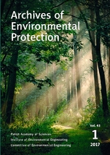
Archives of Environmental Protection
Innovative Insights for a Sustainable FutureArchives of Environmental Protection, published by the Polish Academy of Sciences, is a pivotal journal in the field of Environmental Science. With an ISSN of 2083-4772 and E-ISSN of 2083-4810, this journal serves as a critical platform for disseminating innovative research and comprehensive reviews that address the complexities surrounding environmental issues. As of 2023, it holds a respectable Q3 ranking in Environmental Science, reflecting its relevance and contribution to the academic community, indicated by a Scopus rank of 124 out of 233 in the General Environmental Science category. Although it operates without Open Access, the journal's consistent publication from 2007 to 2024 emphasizes its commitment to advancing knowledge in diverse areas of environmental protection. Researchers, professionals, and students are encouraged to engage deeply with the wealth of insights offered through the rigorous peer-reviewed articles presented in this journal, which strive to foster sustainable practices and environmental stewardship.

Acta Scientiarum Polonorum-Formatio Circumiectus
Connecting global minds to protect our planet.Acta Scientiarum Polonorum-Formatio Circumiectus is a distinguished open-access journal published by WYDAWNICTWO UNIWERSYTETU ROLNICZEGO HUGONA KOLLATAJA KRAKOWIE, dedicated to advancing knowledge in the fields of ecological modeling, environmental engineering, nature and landscape conservation, and water science and technology. With a commitment to accessibility since its inception in 2006, this journal provides a platform for researchers, professionals, and educators to disseminate their findings to a global audience. Although currently categorized in the Q4 quartile across various ecological disciplines, the journal's aim is to foster critical discussions and innovative approaches to pressing environmental challenges. The journal is based in Poland, and its scope encompasses a wide array of research areas pertinent to contemporary environmental studies. Acta Scientiarum Polonorum serves as an essential resource in its field, encouraging empirical research and theoretical advancements that collectively contribute to sustainable development and environmental stewardship.
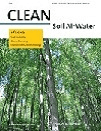
CLEAN-Soil Air Water
Championing Open Access for Environmental AwarenessCLEAN-Soil Air Water, an esteemed journal published by Wiley, serves as a vital platform for disseminating research in the fields of environmental chemistry, pollution, and water science and technology. Operating under an Open Access model, it embraces the principles of knowledge sharing, making significant research findings readily accessible to a global audience. With an ISSN of 1863-0650 and an E-ISSN of 1863-0669, the journal has demonstrated its importance in the academic community, reflected in its Scopus rankings within the top quartiles of its categories. Established in 2007 and continuing through to 2024, CLEAN-Soil Air Water offers researchers, professionals, and students an opportunity to explore innovative studies that address pressing environmental challenges, facilitating an exchange of novel ideas and techniques essential for sustainable development. With a publication footprint in Germany and a growing international reputation, this journal is an invaluable resource for those dedicated to advancing the science and practices of environmental stewardship.

Environmental Processes-An International Journal
Connecting Research and Real-World Solutions in Environmental ScienceEnvironmental Processes-An International Journal, published by SPRINGER INT PUBL AG, serves as a vital platform for researchers and professionals dedicated to the dynamic field of environmental science. Established in 2014, this journal has rapidly gained prominence, currently holding a commendable Impact Factor and achieving impressive Scopus Rankings across various categories, including Q1 status in Water Science and Technology and Q2 in areas such as Environmental Engineering and Health, Toxicology and Mutagenesis. The journal emphasizes innovative research that contributes to the understanding and management of environmental processes and policies, addressing urgent challenges facing our planet. With a focus on high-quality, peer-reviewed content, Environmental Processes invites contributions that explore interdisciplinary approaches, making it a critical resource for scholars, policy-makers, and students invested in fostering a sustainable future through rigorous scientific inquiry. Access options are available for diverse readership, ensuring that essential findings are disseminated widely to inform decision-making and cultivate impact.
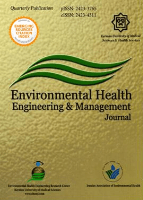
Environmental Health Engineering and Management Journal
Bridging the Gap Between Ecology and Human Well-beingEnvironmental Health Engineering and Management Journal is a premier platform dedicated to the dissemination of research findings in the essential field of environmental health. Published by Kerman University of Medical Sciences in Iran, this Open Access journal has been a beacon of scientific inquiry since its inception in 2014. With an ISSN of 2423-3765 and E-ISSN 2423-4311, it facilitates broad accessibility to cutting-edge research that addresses the complex interactions between environmental factors and human health. With a notable categorization in the Q3 quartile for Environmental Science and Public Health, alongside Q4 in Chemical Health and Safety, the journal underscores its commitment to quality and relevance. Currently ranked #132 out of 233 in Environmental Science within Scopus, it serves as a crucial resource for researchers and practitioners striving to tackle contemporary environmental challenges. The journal's scope includes innovative methodologies, environmental risk assessment, and sustainable health practices, positioning it as an indispensable reference for those invested in improving public health outcomes through environmental engineering and management.